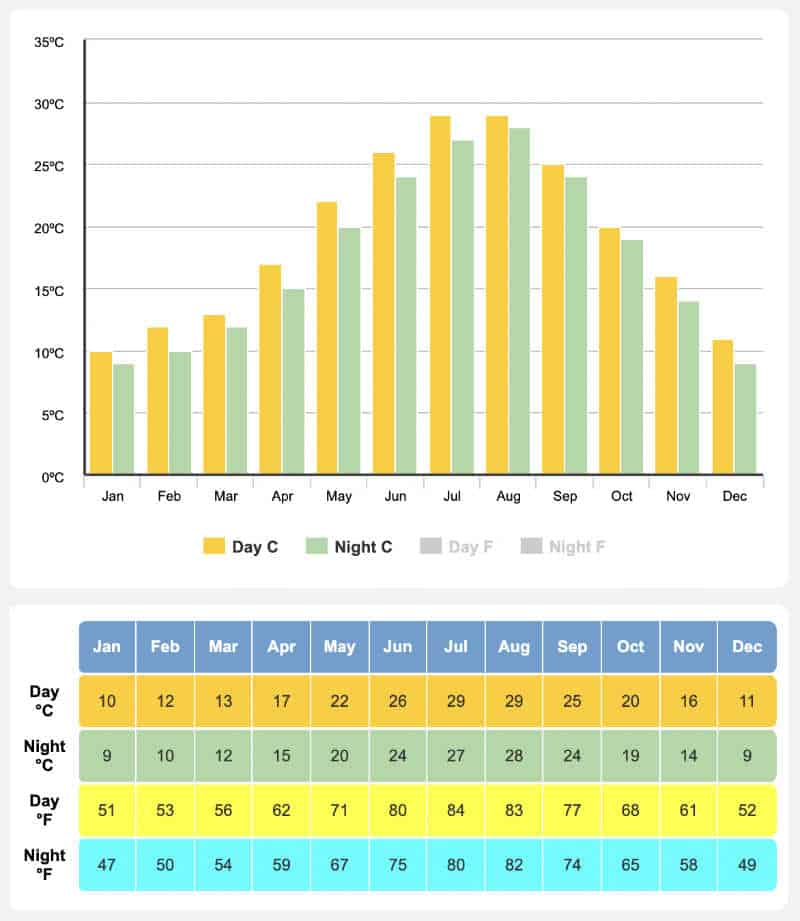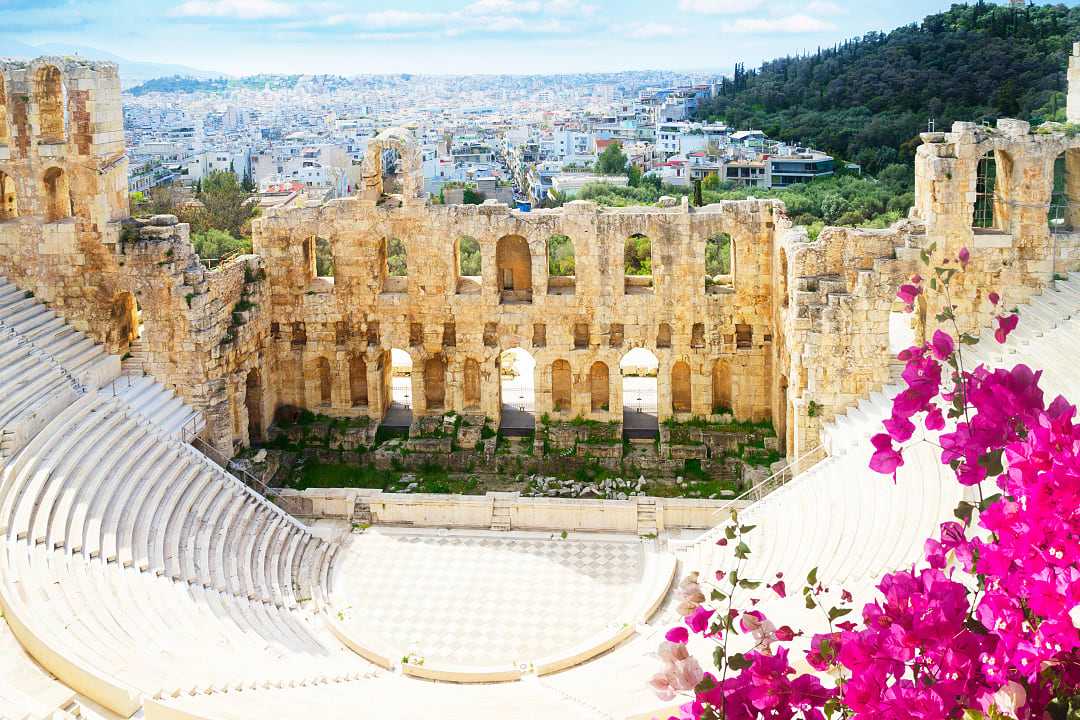Sunshine & Serenity: When to Visit Breathtaking Greece

Best Time To Visit Greece: Overview
Best Time To Visit Greece for ideal weather conditions
In Greece, the best time to visit for ideal weather conditions is typically from May to September. During these months, you can expect warm and sunny weather with minimal chances of rain. The temperatures are perfect for exploring the ancient ruins, relaxing on the beautiful beaches, and enjoying outdoor activities.
If you prefer milder weather, June and September are excellent choices, as they offer pleasant temperatures without the scorching heat of July and August.
Best Time To Visit Greece for avoiding crowds
If you want to visit Greece while avoiding crowds, consider travelling during the shoulder seasons in April, May, September, and October. During these months, the tourist crowds are thinner, allowing you to explore popular attractions without the hustle and bustle.
Additionally, April and October offer comfortable temperatures for sightseeing while avoiding the peak season rush. Choose April for blooming flowers and mild weather, or opt for October for fewer tourists and cooler temperatures.

Spring (March - May)
Weather in Greece during Spring
In Greece, spring (March to May) brings mild temperatures and blooming flowers, making it ideal for exploring ancient ruins and picturesque landscapes. The weather is generally pleasant during this time, with average temperatures ranging from 15°C to 25°C. While March may still be a bit chilly, April and May offer warmer days and cooler nights, perfect for outdoor activities.
Events and festivals in Greece during Spring
Spring in Greece is a time of celebration with various events and festivals throughout the country. One of the most popular festivals is Easter (usually in April), where you can witness traditional ceremonies and enjoy festive food. May Day on May 1st is also a significant holiday, marked with parades and festivities in many towns and cities.
Additionally, various local festivals celebrating spring harvests and cultural traditions can be found across Greece during this time. Whether you want to experience Greek Orthodox traditions or simply enjoy the vibrant spring atmosphere, visiting Greece during spring offers a unique cultural experience.

Summer (June - August)
Weather in Greece during Summer
In Greece, summer (June to August) brings warm temperatures and sunny days, perfect for beach and outdoor activities. The weather during this time is typically hot, with average temperatures ranging from 25°C to 35°C. June offers a pleasant transition from spring, while July and August are the hottest months, ideal for soaking up the sun on the Greek islands.
Events and festivals in Greece during Summer
Summer in Greece is the peak tourist season, with numerous events and festivals happening across the country. August, in particular, is a month filled with celebrations, including the famous Assumption of Mary on the 15th, marked by church services and festivities. It's also a time when many music and cultural festivals take place in various cities, attracting visitors from around the world.
Beach and island hopping during Summer in Greece
One of the highlights of summer in Greece is beach and island hopping. With crystal-clear waters and pristine beaches, the Greek islands offer the perfect escape for sun-seekers and water enthusiasts. From popular islands like Santorini and Mykonos to lesser-known gems like Kefalonia and Crete, each island has its own charm and beauty waiting to be explored.
Whether you prefer relaxing on the beach or engaging in adventurous water sports, summer in Greece is the perfect time to indulge in the Mediterranean coast's stunning beauty.
Autumn (September - November)
Greece's weather in Autumn
In Greece, autumn (September to November) sees a gradual cooling down after the hot summer months. The temperatures range from around 20°C to 30°C, making it a comfortable time to explore outdoor activities without the intense heat of summer. September still offers some warmth, while November starts to bring cooler temperatures and occasional rain showers, signalling the transition to winter.
Cultural and historic sites to visit in Greece during Autumn
Autumn in Greece is a great time to explore the cultural and historic sites that dot the country. From the iconic Parthenon in Athens to the ancient city of Mycenae, there is a wealth of historical landmarks waiting to be discovered. September is an ideal time to visit popular sites before the crowds diminish, while October and November offer a more serene atmosphere for exploring the rich Greek heritage. Additionally, the fall colours in the countryside provide a picturesque backdrop for sightseeing excursions.
The fall season in Greece offers a pleasant transition from the summer heat to cooler temperatures, making it an ideal time to explore the country's diverse cultural and historical offerings. Whether you're interested in ancient ruins, traditional villages, or scenic landscapes, autumn provides a unique opportunity to delve into Greece's rich history and natural beauty.

Winter (December - February)
Weather conditions in Greece during Winter
Winter in Greece brings cooler temperatures and occasional rainfall. Daytime temperatures range from 8°C to 15°C, while nights can get colder, especially in mountainous regions. December starts the winter season with a transition from autumn, while February marks the approach of spring. Snowfall is rare in the coastal areas but more common in the mountains, offering a picturesque winter landscape.
Winter sports and activities in Greece
During the winter months, Greece offers a variety of winter sports and activities for enthusiasts. The mountainous regions provide opportunities for skiing, snowboarding, and snowshoeing. Popular destinations include Mount Parnassos, Mount Pelion, and Mount Olympus. The crisp winter air and snowy slopes create a perfect setting for outdoor adventures. Winter festivals and cultural events also take place, allowing visitors to experience the season's festive spirit.

Popular Destinations
Best time to visit Athens, Santorini, Mykonos, and Crete
When planning your trip to Athens, Santorini, Mykonos, and Crete, the best time to visit is spring and fall. Spring (March to May) offers mild temperatures, blooming flowers, and fewer crowds, making it an ideal time to explore historic sites in Athens and enjoy the stunning views of Santorini. Fall (September to November) brings pleasant weather for beach activities in Mykonos and Crete, with comfortable temperatures and clear skies.
Off-the-beaten-path destinations in Greece
For travellers seeking unique experiences, exploring off-the-beaten-path destinations in Greece can provide a glimpse into the country's hidden gems. Zagori, located in northwestern Greece, offers breathtaking landscapes, traditional stone villages, and hiking trails for outdoor enthusiasts. Nafplio, a charming seaside town in the Peloponnese region, boasts historical sites, picturesque streets, and a relaxed atmosphere.
Kastoria, situated near Lake Orestiada in northern Greece, is known for its stunning Byzantine churches, lakeside views, and cultural richness. Venturing off the typical tourist path can lead to discovering Greece's lesser-known but equally captivating sides.

Budget Considerations
Best time to visit Greece for budget travellers
When considering a budget-friendly trip to Athens, Santorini, Mykonos, and Crete, the best time to visit is during the shoulder seasons of spring and fall. In spring, from March to May, accommodation prices are more reasonable before the peak summer season, and you can enjoy lower airfare rates.
Fall, spanning from September to November, also offers competitive pricing on accommodations and activities, allowing budget travellers to experience the beauty of Greece without breaking the bank.
Tips for saving money while travelling in Greece
- Accommodations: Consider staying in budget-friendly options such as hostels, guesthouses, or Airbnb to save on lodging costs.
- Transportation: Opt for public transportation like buses and ferries, which are more economical than taxis. Consider renting a scooter or bicycle for short distances.
- Dining: Explore local tavernas and street markets for affordable and authentic Greek meals. Avoid dining in tourist hotspots where prices tend to be higher.
- Activities: Look for free or low-cost activities such as hiking, swimming, and exploring historical sites to make the most of your trip without overspending.
- Souvenirs: Shop at local markets and stores away from tourist areas to find unique souvenirs at better prices compared to shops in popular tourist spots.
By following these tips and visiting Greece during the shoulder seasons, budget travellers can enjoy a memorable experience in this beautiful country without straining their finances.

Local Festivals and Events
Notable festivals and events in Greece throughout the year
When exploring Greece, you can immerse yourself in the vibrant local culture by partaking in various festivals and events held throughout the year. Some notable celebrations include the Athens Epidaurus Festival in summer, featuring many performances ranging from theatre to music, providing a glimpse into Greece's artistic heritage. Apokries, the Greek Carnival season held in February, offers colourful parades, traditional music, and lavish feasts, allowing visitors to experience the country's festive spirit.
Cultural experiences to enjoy during specific times of the year
During Easter in Greece, you can witness unique traditions such as the Good Friday processions and Midnight Resurrection service, offering insight into the country's religious customs. Ochi Day on October 28th commemorates Greece's refusal to surrender during World War II, with parades and ceremonies occurring across the country. If you visit Crete in August, you can partake in the Diktaia Festival, celebrating the island's cultural heritage through music, dance, and folklore performances.
By timing your visit to Greece with these festivals and events, you can enrich your travel experience and better understand the country's rich cultural tapestry.
